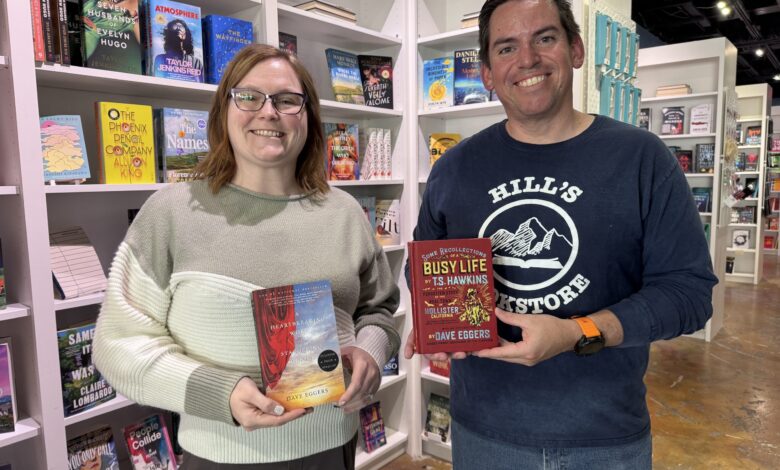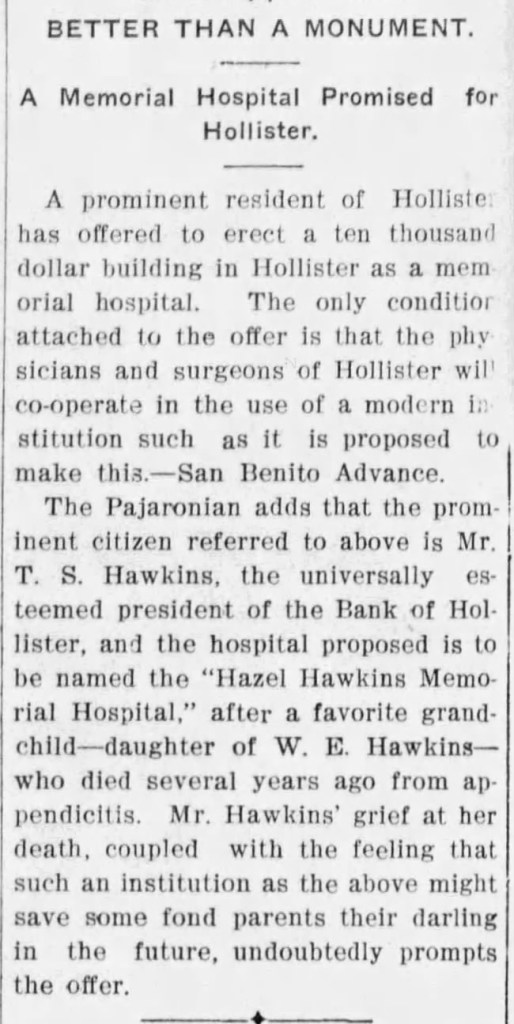Q&A with author, publisher and youth literacy advocate Dave Eggers

Lea este artículo en español aquí.
In the current publishing landscape, smaller independent bookstores have to struggle to attract major authors for events. But a personal appeal from Hill’s Bookstore co-owner Kimberly Hill was enough to secure Dave Eggers, one of today’s most creative authors and publishers, for an event to be held on Oct 25 at the Community Foundation Epicenter Building.
“I wrote him a nicely worded letter,” she said, “telling him we would love to have him come by, whether for a presentation, a book signing, or just to pop in and say hello. Three days later, we got an email saying Dave would be happy to come.”
Eggers might be best known to local readers and historians for republishing “Some Recollections of a Busy Life,” the memoirs of his great-great-grandfather, T. S. Hawkins, who founded Hazel Hawkins Memorial Hospital.
“Some Recollections” was first published in 1913. It chronicles the life of T. S. Hawkins, detailing his journey from Ohio to California during the Gold Rush, his experiences in the Sierra Nevada mines, and his time in Gilroy and Hollister.
The last section of the book is a poignant retelling of the death of his granddaughter, Hazel Hawkins, from appendicitis in 1902. Determined that no one else in the community would die due to a lack of adequate medical facilities, Hawkins pledged more than $30,000 (about $500,000 today) toward the construction of what he intended to be a model hospital.
“Dave is much more than just an author,” bookstore co-owner Adam Hill said. “He will be bringing a wealth of history to our community, and I think that’s important for folks to hear and be able to see.”
Few authors have had such a varied and impactful career. Eggers won the 2024 Newbery Medal for “The Eyes & the Impossible,” the 2007 Prix Médicis étranger for “What Is the What,” and the 2009 American Book Award for “Zeitoun.” He was a finalist for the 2001 Pulitzer Prize for “A Heartbreaking Work of Staggering Genius,” the 2012 National Book Award for “A Hologram for the King” and the 2006 National Book Critics Circle Award for “What Is the What.”
Eggers also co-wrote screenplays for “Where the Wild Things Are” (2009), “Away We Go” (2009), and “Promised Land” (2012), and founded the publishing house McSweeney’s.
In 2002, he co-founded 826 Valencia, a nonprofit focused on providing free writing and tutoring programs for youth. The program has since expanded to become 826 National, a network of eight chapters across the U.S.that offers free programs such as after-school tutoring, writing workshops, in-school support, and publishing opportunities.
In 2017, he co-founded The Hawkins Project to expand on the work begun by 826 Valencia, supporting more than 903,000 students across the United States as they explore ways to refine their writing skills.
In an interview with BenitoLink, Eggers reflected on his great-grandfather’s legacy, his own work promoting youth literacy and creativity, and the importance of bookstores like Hill’s to the community.
BenitoLink: Hollister quickly grew into a sophisticated city, at one point even having an opera house. What do you think created this urge in people like T. S. Hawkins for public good rather than private greed?
Dave Eggers: From his book, “Some Recollections of a Busy Life,” it seems that T. S. Hawkins was a very community-minded person who saw a need and then got together with like-minded people to meet that need. He kept it simple. Hollister needed a bank, so he created the town’s first bank. And when his young granddaughter, Hazel Hawkins, died due to inadequate medical care, he went about founding the town’s first hospital. He got things done without much fuss.
What do you think Hawkins would think of Hollister as it stands today?
I think he would be incredibly proud. Especially given the growth of the hospital, and how it cares for people of all backgrounds, no matter their economic strata. That was the point of creating a high-quality medical facility in a rural area, and it’s as urgent now as ever. And the fact that so many of Hollister’s original wood-frame Victorians still stand would please him to no end.
Hollister has slowly turned into a commuter city, with an influx of people moving down from San Jose who have no family connection to the county or knowledge of its history. How can we make the past come alive for them?
Wouldn’t it be great to create a museum where T. S. Hawkins’s original hospital stood? I love that building, and it would make a great site celebrating the history of the region. How do we make this happen?
Both high schools in the county, Hollister and Anzar, demonstrate above-average performance in English Language Arts and English Learner Progress. How can we best encourage these skills in reading and creative writing?
These are unprecedented times, when AI is tempting millions of students to cut corners and have a machine do their work for them. But AI writing is not writing. AI art is not art. And if you have a machine write for you, you’re not only cheating—because of course this is cheating; it’s beyond plagiarism—but you’re cheating yourself out of the chance to speak your mind and own your thoughts. There is nothing more dystopian than having humans allow machines to express their thoughts.
But I’ve seen so many gifted teachers rise to this moment and do something kind of wonderful: they’re having students hand-write their papers again. In class. In cursive even! And the results are fantastic, because if a student can write a coherent essay in class, they are thinking clearly, expressing themselves effectively and economically, too. I personally think a coherent three-paragraph essay, written in class, is just as important as the five-page research paper written at home.
And if AI has driven us back to a situation where most of student writing, even at the high school level, is handwritten on paper, then we might have arrived at an unexpectedly beneficial byproduct to this unprecedented crisis.
What kind of impact do you think independent booksellers like Hill’s can have on a small community like Hollister?
Every great town needs a great bookstore. It’s a meeting place, a cultural hub, and a repository of ideas. I’m so happy that Hill’s exists, and I know the community will step up to make sure it survives.
What are you reading right now?
I’m often reading books that are in the galley stage, so I just finished George Packer’s upcoming novel, “The Emergency,” about a nation in crisis. It’s an allegory only vaguely related to our own country’s crises, but disturbing nonetheless. Now I’m ready for some lighter fare.

The upcoming event
Kimberly Hill, whose favorite book by Eggers is “The Eyes and the Impossible,” said she is excited about the event and is hoping that his presentation on his great-great-grandfather’s book would get people more interested in the community they live in.
“I think it’s really important with the climate of the town to bring him here,” Kimberly said, “We are just going to let Dave kind of have the floor and let him take it away. I think that people are going to be as excited as we are to hear from someone of his caliber.”
Hill’s Bookstore will be hosting Dave Eggers in a discussion of “Some Recollections of a Busy Life” by T. S. Hawkins on Oct. 25 from 5 p.m. to 7 p.m. at the Community Foundation Epicenter Building. Tickets are available at no cost through Eventbrite.
Books by Eggers, including a limited number of copies of the Hawkins book, will be available for purchase. The San Benito County Historical Society is also going to be displaying a copy of the original “Some Recollections of a Busy Life.”
Related stories
Author to discuss book rich in Hollister history
Thomas Samuel Hawkins: A highly interesting and busy life
County historical museum is now open on Saturday
Eggers thanks Hospital Auxiliary
New Yorker Magazine writer with local ties tells the tale of ‘The Actual Hollister’
Acclaimed author Dave Eggers draws inspiration from T.S. Hawkins’ story
We need your help. Support local, nonprofit news! BenitoLink is a nonprofit news website that reports on San Benito County. Our team is committed to this community and providing essential, accurate information to our fellow residents. Producing local news is expensive, and community support keeps the news flowing. Please consider supporting BenitoLink, San Benito County’s public service nonprofit news.
Source link
